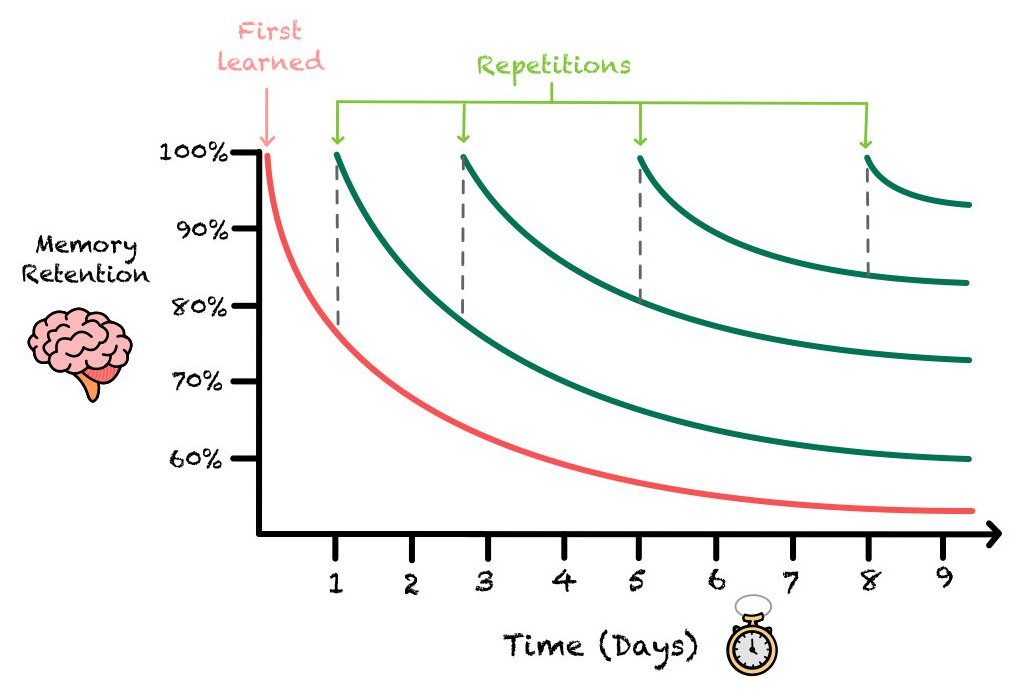
Study Tips
“Give me 6 hours to chop down a tree and I will spend the first 4 hours sharpening the axe.”
- Abraham Lincoln.
The importance of how you study
In this section I break down the scientifically proven best ways to learn and memorise information. Absorbing and applying these techniques can allow your time studying to be effective as possible.
It has taken 6 years of Secondary School and 4 years of Medical School until I truly understood these techniques and applied “Active Recall” and “Spaced Repetition” into my studying. The best way that I can think to help you “Get the Grade”, is to show you these techniques as early as possible, so that you can continue to utilise them throughout school and beyond.
Active Recall
Active recall is testing yourself. Flashcards, practice questions and past papers are an excellent way of testing your knowledge in any subject.
When testing yourself, don’t be afraid to get some questions wrong. The questions that you get wrong in your practice are the ones that will most likely stick in your brain after multiple repetitions. I suggest testing yourself before and after revising a subject, so that you can keep track of your progress and make valuable mistakes earlier in your study, not later.
You can't truly feel confident in knowing something until you have been tested on it, so make sure that you test yourself multiple times before an exam.
Spaced Repetition
Spaced repetition is repeating a process multiple times with gradually increasing periods of time between repetitions. So if you test yourself on a subject once, you should test yourself again, and again, and again.
Ensure that you take note of the subjects and knowledge that you are weaker on, so that you can repeat these sections more frequently.
The key to this technique is increasing the period between repetitions. So if you were to test yourself on a topic once, leave a day until your next repetition, then 3 days until your third repetition, then a week, then two weeks and so on. Increasing the period between repetitions aids long-term memory, so using this early aids your studies in later years.
The given diagram represents “the forgetting curve”. On the Y-axis, we have the memory retention of facts after testing yourself on them. On the X-axis, we have time.
It is inevitable that you will forget facts that you learn. That is why it is so important to keep topping this pool of information up as it will drain over time. The more you repeat testing your knowledge, the slower this information will drain from your memory.
Video Recommendations
Ali Abdaal has some excellent videos on study tips, I highly recommend taking the time to watch through these two videos:
References and Evidence
Karpicke JD, Roediger HL 3rd. The critical importance of retrieval for learning. Science. 2008 Feb 15;319(5865):966-8. doi: 10.1126/science.1152408. PMID: 18276894.
Roediger HL, Karpicke JD. Test-enhanced learning: taking memory tests improves long-term retention. Psychol Sci. 2006 Mar;17(3):249-55. doi: 10.1111/j.1467-9280.2006.01693.x. PMID: 16507066.
Augustin M. How to learn effectively in medical school: test yourself, learn actively, and repeat in intervals. Yale J Biol Med. 2014 Jun 6;87(2):207-12. PMID: 24910566; PMCID: PMC4031794.
Roediger HL 3rd, Butler AC. The critical role of retrieval practice in long-term retention. Trends Cogn Sci. 2011 Jan;15(1):20-7. doi: 10.1016/j.tics.2010.09.003. Epub 2010 Oct 15. PMID: 20951630.
Tabibian B, Upadhyay U, De A, Zarezade A, Schölkopf B, Gomez-Rodriguez M. Enhancing human learning via spaced repetition optimization. Proc Natl Acad Sci U S A. 2019 Mar 5;116(10):3988-3993. doi: 10.1073/pnas.1815156116. Epub 2019 Jan 22. PMID: 30670661; PMCID: PMC6410796.



